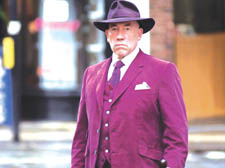|
|
 |
| |

Simon Callow as classics professor Oliver Haddo |
Camden cinema | Chemical Wedding movie review | occultist Aleister Crowley | Simon Callow
CHEMICAL WEDDING
Directed by Julian Doyle
Certificate 18
CHEMICAL Wedding is a tale of how a Cambridge don, testing out a virtual reality machine, manages to become possessed by the spirit of occultist Aleister Crowley.
It is best to spell out the plot in such simple terms, as this film, written and co-directed by rock singer Bruce Dickinson of Iron Maiden fame, is such a mish-mash of low-budget horror and creaky science fiction that it’s virtually impossible to understand what it’s all about after the opening five minutes.
Crowley, who died in 1947, made his name by spouting on about quasi-religious, paganistic theories, whose end result was often to ensure he was sexually satisfied. His reputation was whipped up by tabloid reporters looking for something to shock Edwardian Britain. This created his public persona, which was then given further credence by the addled brains of 1960s and 1970s rock ’n’ roll bands, and when author Dickinson became interested in his theories.
The film rolls with the death of Aleister Crowley, witnessed by two Cambridge undergraduates, and then dashes to a high-tech Star Trek bridge-style computer lab, complete with some kind of space suit and glass box ensemble with dry ice that special effects people like to use to illustrate one character transforming into another. Think The Fly. Think Spiderman I, where Willem Dafoe turns into The Green Goblin.
Simon Callow, playing classics professor Oliver Haddo, is the fellow possessed.
It is not Callow’s finest hour. He tries to ring as much drama from his character, speaking in rolling Shakespearean dialect, lurching forward, eyes staring heavenwards. But all his efforts are wasted. With shocking support performances, a script that feels like a school play, and a rambling plot without direction, the week or so he must have given up to squeeze in his scenes would have been better spent hiding in his garden shed.
The saddest thing is that a film about Aleister Crowley could be quite interesting. It could look behind devil worshipping mumbo-jumbo and find a tale worth dramatising.
Crowley’s research into the occult and how he became well known could be of interest. They could have discussed the psychological effects prolonged hard drug abuse has on the brain (he was a heroin addict) or anthropologists could have considered the reason people are attracted to “spiritualism”.
Sadly, we are treated to a film that is piffle, occasionally offensive in its treatment of the female characters, and illuminates nothing but the poor taste of the writer. |
 |
|
 |
| |
|
 |
|

